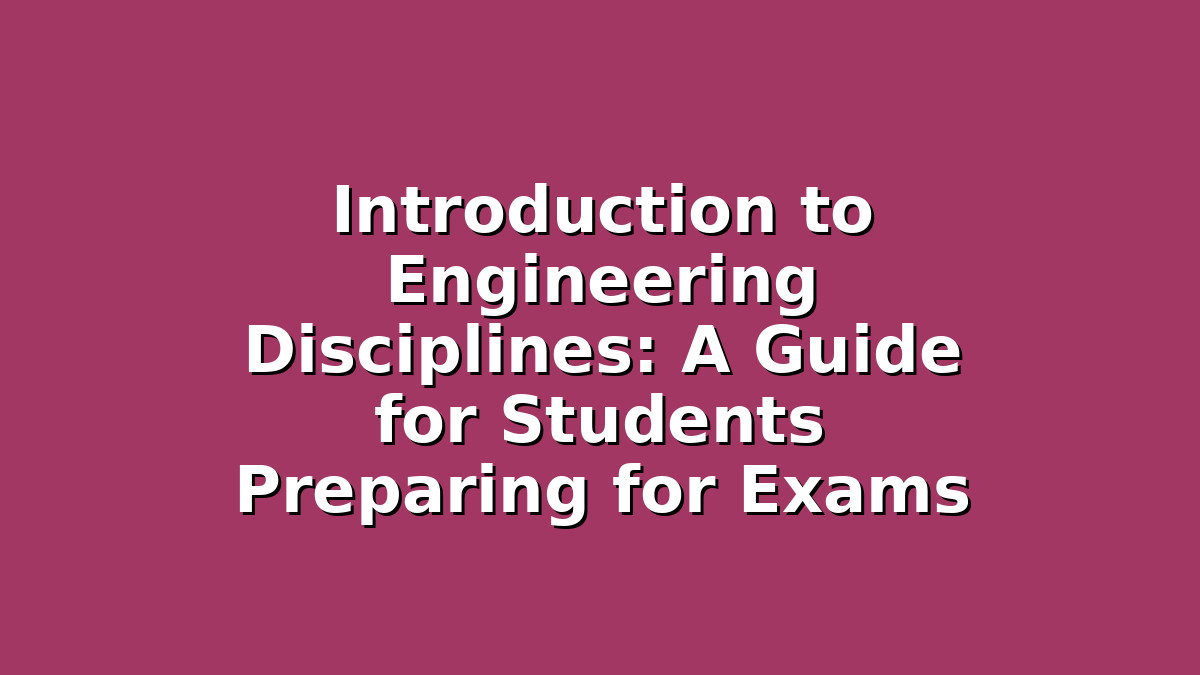Choosing to pursue a career in engineering is an exciting and rewarding decision. Engineering is a broad field that encompasses a variety of disciplines, each with its own unique focus, challenges, and opportunities. For students preparing for exams or planning their academic paths, understanding the fundamental engineering disciplines can help in making informed decisions and developing effective study strategies. This article will introduce you to some of the most popular engineering branches, offer study tips tailored to each, and encourage you to stay motivated throughout your learning journey.
Understanding the Major Engineering Disciplines
Engineering is the application of science and mathematics to solve real-world problems. It is divided into numerous disciplines, but some of the most common ones include Mechanical Engineering, Electrical Engineering, and Civil Engineering. Each discipline demands a different set of skills and knowledge. Let’s explore these in more detail and discuss how students can prepare effectively for exams in these fields.
#### Mechanical Engineering: The Backbone of Innovation
Mechanical Engineering is one of the oldest and broadest branches of engineering. It involves designing, analyzing, and manufacturing mechanical systems such as engines, machines, and tools. Mechanical engineers work in industries ranging from automotive to aerospace and robotics.
Study Tips for Mechanical Engineering Students:
– Master the fundamentals of physics and mathematics: Subjects like dynamics, thermodynamics, and materials science form the core of mechanical engineering. Make sure you understand the basic principles thoroughly.
– Practice problem-solving regularly: Engineering exams often test your ability to apply concepts to real-world problems. Work on past exam papers and problems from textbooks.
– Use visual aids: Diagrams, charts, and 3D models can help in understanding complex mechanical systems. Consider using software tools like CAD (Computer-Aided Design) to enhance your visualization skills.
– Form study groups: Mechanical engineering topics can be challenging. Collaborating with peers allows you to share knowledge, clarify doubts, and learn different problem-solving approaches.
#### Electrical Engineering: Powering the Future
Electrical Engineering focuses on electricity, electronics, and electromagnetism. This discipline covers areas such as circuit design, control systems, telecommunications, and power generation. Electrical engineers play a vital role in developing technology that powers modern life.
Study Tips for Electrical Engineering Students:
– Strengthen your understanding of circuit theory and electromagnetics: These subjects are foundational. Use simulation software like Multisim or LTSpice to experiment with circuits virtually.
– Stay up-to-date with technology trends: Electrical engineering evolves rapidly. Supplement your textbooks with online tutorials, webinars, or industry news to keep pace.
– Work on hands-on projects: Applying theory in practical projects, such as building simple circuits or programming microcontrollers, reinforces learning and builds confidence.
– Organize your study material well: Electrical engineering involves complex formulas and concepts. Create concise notes, formula sheets, and mind maps to aid quick revision before exams.
#### Civil Engineering: Building the World Around Us
Civil Engineering deals with designing, constructing, and maintaining infrastructure like roads, bridges, buildings, and water systems. It integrates knowledge of materials, structural analysis, and environmental science to create safe and sustainable structures.
Study Tips for Civil Engineering Students:
– Develop strong analytical skills: Subjects like structural analysis and soil mechanics require logical thinking and attention to detail. Practice numerical problems extensively.
– Understand construction materials and methods: Knowing the properties and behavior of materials such as concrete, steel, and composites is essential. Try to visit construction sites or watch documentaries to gain practical insights.
– Make use of design software: Tools like AutoCAD and STAAD Pro are widely used in civil engineering. Familiarity with these can enhance both your learning and employability.
– Time management is key: Civil engineering courses often have extensive coursework and projects. Create a timetable that balances study, assignments, and revision to avoid last-minute stress.
General Study Tips for Engineering Students Preparing for Exams
Regardless of your chosen discipline, there are several universal strategies that can help you succeed in your engineering exams:
– Start Early and Plan: Engineering subjects can be dense and complex. Begin your exam preparation well in advance by creating a study schedule that breaks down topics into manageable chunks.
– Focus on Understanding, Not Memorization: Engineering problems require applying concepts, not just recalling facts. Aim to deeply understand theories and principles.
– Use Multiple Resources: Combine textbooks, online courses, video lectures, and practice problems to get diverse perspectives and explanations.
– Practice Past Papers: Familiarize yourself with exam formats and question styles by solving previous years’ papers under timed conditions.
– Stay Healthy: Regular breaks, proper nutrition, exercise, and enough sleep improve concentration and memory retention.
– Seek Help When Needed: Don’t hesitate to ask teachers, tutors, or classmates for clarification. Discussing difficult topics can enhance your comprehension.
Conclusion
Exploring the various engineering disciplines can help you find the area that best matches your interests and strengths. Mechanical, Electrical, and Civil Engineering each offer unique challenges and rewarding career paths, but all require dedication, consistent study, and practical application of knowledge. By adopting effective study habits tailored to your discipline and maintaining a positive, proactive attitude, you can excel in your exams and set the foundation for a successful future in engineering.
Remember, engineering is not just about mastering equations or theories—it’s about solving problems that impact the world. Stay curious, stay motivated, and keep pushing your limits. Your hard work will pay off!

Responses